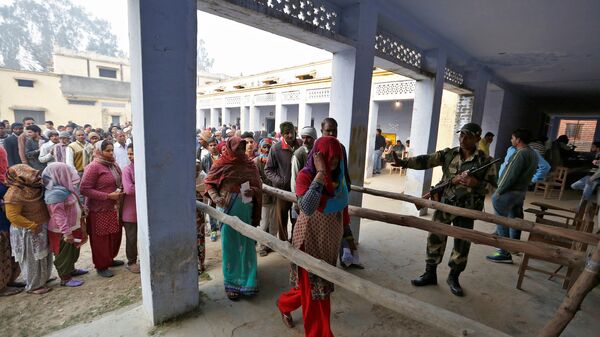Saturday’s legislative assembly polls in India’s capital city will see nearly 14.6 million eligible voters exercising their franchise at 13,750 polling stations across Delhi.
These voters will seal the fate of the three main political parties who will be keeping their fingers crossed for a surprise win based on their month-long political campaigning in the streets of Delhi, involving various political stalwarts.
While AAP chief Arvind Kejriwal is once again his party’s chief ministerial face, both the BJP and the Congress have not declared their candidates for the top seat in the event that their party is elected to power.
The election can be seen as a verdict on the delivery of promises by the Arvind Kejriwal-headed ruling AAP; a chance for Congress to resurrect or the Bharatiya Janata Party’s (BJP) chance to assume power after 20 long years.
The elections are also a matter of prestige for the top politicians in the three main parties.
Smaller parties set to do battle include the Bahujan Samaj Party (BSP), Akali Dal, Janata Dal-United regional parties, and independent candidates.
2015 Delhi Assembly Polls
Last time, in the 2015 Assembly polls, the newly-formed AAP came to power with a landslide victory winning 67 of the 70 State assembly constituencies. The other three three seats were secured by the BJP. Congress, which before 2015 ruled Delhi for three consecutive terms (15 years), was wiped out.
This time therefore, the election is an existential fight for Congress.
Voter Demography
With the total number of voters going up by 1.6 million, the election will see 200,000 first-time voters (aged 18-19), which the political parties have tried their best to woo through social media campaigns and fielding young and fresh faces.
According to the Election Commission of India, of the total 14.6 million voters, the ratio of female voters has gone up to 824 per 1,000 male voters compared with 802 per 1,000 in 2015, when the last state elections took place. The total number of male and female voters is over 8.05 million and over 6.6 million respectively. There will also be around 815 third gender voters who are eligible to participate in Saturday’s poll.
Major Issues for Delhi Voters
- Law and Order: According to the latest figures of National Crime Research Bureau, crime watchdog, Delhi reported the highest number of crime in the country with 200,000 such incidents.
- National Issues: Delhi has been a hub of protest against the Citizenship Amendment Act (CAA), which offers Indian citizenship to non-Muslim immigrants from Pakistan, Afghanistan, and Bangladesh. Protests against this contentious citizenship law have fuelled speculation that voters will be divided along religious lines.
- Water: Water, which has been a big issue in Delhi for years, holds a big significance for voters across Delhi. Though the ruling party claims to have done a lot to mitigate various issues related to water in many parts of the city, the opposition parties refute this.
Controversies-hit Elections
The election commission on 5 February issued a notice to BJP spokesperson Sambit Patra for violating the Model Code of Conduct by giving an objectionable statement on a news channel regarding Kashmir.
Similarly, the poll watchdog issued a notice to BJP MP Parvesh Verma for allegedly calling Delhi State head Arvind Kejriwal a “terrorist”, after which, the party removed him from its list of star campaigners.
The AAP couldn’t escape trouble either. The election commission notified party leader Sanjay Singh for allegedly making a statement that could create “create confusion and panic” in Delhi.
The Model Code of Conduct is a set of guidelines issued by the election commission highlighting Dos and Don’ts for political parties and candidates during elections, mainly regarding speeches, polling days and polling booths.


